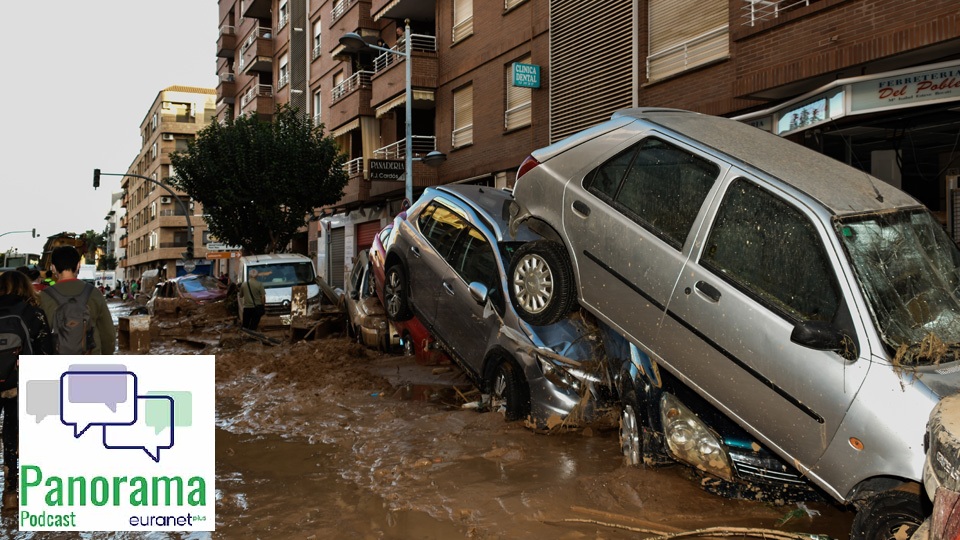Panorama 18.04.2025
Euranet Plus Panorama is a weekly news review that showcases our network’s wide-ranging coverage of EU-related stories.

Radio România Internațional, 25.04.2025, 18:11
Europe on a climate roller coaster
2024 is the year of all superlatives for Europe’s climate, according to the EU’s new Copernicus climate report.
This week, despite the usual media noise from the White House and the Easter holidays across Europe, the release of the Copernicus 2024 report on Tuesday 15 April did not go unnoticed by the radio stations in our network.
2024 is a record year for the European climate says one of Europe’s main research programme: the hottest year ever recorded on the continent – and worldwide – and a turning point in the acceleration of the process: 2024 was indeed the first year to exceed +1.5°C of warming compared to the pre-industrial era. The thermometer broke records in almost half of the continent, with southern and south-eastern countries the hardest hit.
The report, published by the European Copernicus Programme in collaboration with the World Meteorological Organisation (WMO), also confirms that the European continent is warming twice as fast as the rest of the planet. +2.4°C over the last five years, compared to a global average of 1.3°C.
Francisco Ferreira, president of the Portugal’s leading climate association „Zero”, admits to our colleagues at Radio Renascença that he was surprised by these findings.
Francisco Ferreira, President of Associação Zero – (in Portuguese)
“The report shows that the climate is on a real rollercoaster ride. We have to adapt to a climate that is getting further and further away from normal. 2024 was the record with a pattern that is not what we would perhaps expect.”
Last year was also one of the ten wettest years ever for Western Europe, with several countries experiencing 30 to 40 extra days of rain, while some areas in the east of the continent had up to 50 fewer days of rain.
Giulio Betti, climatologist at Italy’s National Research Council, tells Radio 24 why Europe is warming faster than the rest of the planet.
Giulio Betti, climatologist and meteorologist at the Italian National Research Council (CNR) (in Italian)
“Europe is warming twice as fast as the rest of the planet. This is a well-known fact, an obvious fact, precisely because of its particular geographical location, which makes it particularly exposed, especially to heat flows, which clearly warm the tropics, subtropics and oceans. Europe is in a kind of perfect climate storm, as temperatures are inevitably rising twice as fast as in the United States, for example.”
The European Green Deal, the EU’s climate change strategy, is under renewed criticism in recent months for its alleged negative impact on Europe’s competitiveness. The report reminds us that the consequences of this transition will come at a significant cost to our economy.
Globally, climate events are expected to cause €18.2 billion in damages by 2024. More than 400,000 people will be affected.
Andrew Ferrone, a senior official at Luxembourg’s Ministry of the Environment, warns in an interview with Luxembourg’s 100,7 radio station that we will increasingly feel the effects of climate change calling for more action on nature restoration.
Andrew Ferrone, Senior official at the Luxembourg Ministry of the Environment (in Luxembourgish)
“Temperatures will rise. Heat waves will be longer and more intense. This means that heat stress will increase, so it is important that everyone has access to water, for example during heat waves. But green spaces are also very important, for example green spaces in cities, as well as open spaces, i.e. areas with water. They cool the air, purify it and pull the CO2 out of the atmosphere. […] But we also have to prepare for the fact that there will be more and more intense rainfall in Luxembourg; this means that we also need to prepare for more flooding. Nature restoration, for example, can play a very important role in this regard.”
Brussels is expected to put forward a plan to align Europe’s 2040 climate efforts later this Spring in what is expected to become one the most controversial issues of the new European Commission.






























